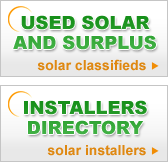Property tax exemption for renewable energy systems
Sales and use tax exemption for solar and geothermal systems
Connecticut Housing Investment Fund, Inc. (CHIF) – Energy
conservation loan
-
These loans are available to single families to be used for energy
conservation improvements.
-
Loan amounts for single family residences start at $400 and go
up to $25,000.
Connecticut Clean Energy Fund (CCEF) - Solar PV rebate program
-
This rebate program is available to residential customers within
service territories of United Illuminating Company or Connecticut
Light and Power with grid-connected photovoltaic systems.
-
Rebates begin at $1.75 per kilowatt for the first five kilowatts
and decreases to $1.25 per kilowatt for the next five kilowatts.
-
Eligible systems can not be over 10 kilowatts, inverters and installation
must carry a minimum 5 year warranty and PV panels must carry a minimum
20 year warranty.
-
Maximum incentive amount for residential systems is $15,000.
CT solar lease
-
Through CT solar lease, homeowners can lease a photovoltaic system
with fixed monthly payments for a 20 year period.
-
All energy generated by a leased PV system reduces the homeowner’s
electric bill.
-
The homeowner may purchase the system at the end of the 15th year
at a reduced price.
-
After 15 years, the homeowner may either extend the lease for another
5 years or have the system removed at their expense.
Net-metering
-
Net-metering is available to customers of United Illuminating Company
and Connecticut Light and Power that generate electricity using "Class
I" renewable-energy resources.
-
Systems capacity limit is 2 MW.
-
Any net excess generation produced by the customer during a monthly
billing period will be carried over to the following month as a credit.
Residential Renewable Energy Tax Credit
-
This personal tax credit allows the taxpayer to claim a credit
of 30% of expenditures including labor costs and installation of qualified
residential solar-electric systems, solar water heating systems or
fuel cells. Small wind-energy systems and geothermal heat pumps can
also be accredited for.
-
Solar-electric systems and solar water heaters have a maximum incentive
of $2,000 if placed in service before 2009. There is no maximum incentive
for systems placed after 2008.
-
The excess amount of the federal tax credit may be carried forward
to the next taxable year if it exceeds tax liability.
Residential Energy Conservation Subsidy Exclusion
-
This is a personal exemption of 100% of energy conservation subsidies
provided by public utilities.
-
The value of a purchase or installation of any energy conservation
measure by a customer such as solar water heat, solar space heat or
photovoltaics will not be included in the customer’s gross income.
-
Customers of an electric utility company, who participate in the
utility’s energy conservation program, may receive a rate reduction
of electricity furnished or a nonrefundable credit against the purchase
price of the electricity on each monthly electric bill.
Energy-Efficient Mortgages



